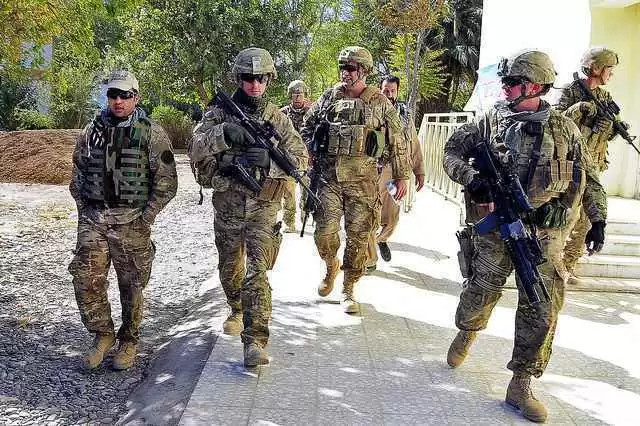
Celiac.com 07/29/2017 - "So what did you eat over there?"
I had only been back for a few days from a year-long deployment overseas and it seemed to me my friends and family were all fascinated that I went to war on a gluten free (gluten-free) diet. They all knew I was gluten-free. I had been strictly adhering to the diet for well over a decade, and many of them had worried about my health in addition to my safety and well-being. In truth, it had been overwhelming at times. The military complex was not set up to cater to food allergies (or auto-immune responses) and I frequently had to order food to maintain a gluten-free existence. Besides the extra cost, the logistics of getting gluten-free food into Afghanistan were mind boggling. Yet, I was often seen around Kandahar with a gluten-free roll in my cargo pocket, trying my best not to crush it to pieces with the barrel of my loaded M16.
Celiac.com Sponsor (A12):
As a Captain in the United States Army I had the resources to make this happen. I would demand meetings with dining facility mangers, and would pay out of pocket the high shipping cost of getting gluten-free food to Kandahar (a process that took so long the food often arrived moldy or destroyed). I would contact home and was sent additional gluten-free foods from family, friends, and co-workers. My diet, which became primarily salad and packaged gluten-free food, turned out to be sustainable over the course of the deployment. Of course, it was not without its struggles, and in retrospect a lot of the hardship could have been avoided if the military would recognize a need to cater to special diets, in the same way it does for Kosher or Vegetarian meals.
So why doesn't the military provide a gluten-free alternative? In my opinion it is because no one is asking for it. While overseas I attempted to find other gluten-free dieters, and celiacs, to reach out to them and document their struggles. I found over fifteen others simply by asking around Kandahar. Yet, even if I could prove that hundreds of people needed a gluten-free diet, it would be fruitless since many of them are too afraid of a discharge to bring up the dietary requirement. Part of this fear is unfounded since celiac disease is not specifically listed in AR 40-501 (The Standards of Medical Fitness); but, part of it is founded since "Nutritional Deficiencies" are listed and can be cause for rejection from service. Not wanting to risk their careers, these soldiers simply sacrifice their health.
This risk that the military may ban celiacs is simply acceptance of the quiet suffering of these service members. It is naïve to think otherwise. Should a hot shot superior read my story, throw me out and ban other celiacs (which, albeit unlikely, is possible) all they would be doing is sending a message to others with special diets to keep their mouths shut (pun intended). A more logical approach would be to take simple steps such as listing allergens from the 2004 Food Allergen Labeling and Protection Act on dining facility food. This would go a long way toward improving the lives and health of service members worldwide. Yet, if no one complains then the Army can easily determine it does not need to change. While a few of us may make waves from time to time it may very well take a literal act of congress before a gluten-free- MRE (Meal Ready to Eat) or gluten-free foods are a viable option for service members.
Since my memoir, Gluten Free in Afghanistan, was published. many service members have contacted me to share their experiences. Only one has said she was discharged due to celiac disease. Most are still serving after being diagnosed by the Army. Many of them reported similar experiences to my own; which is being sent to a Medical Evaluation Board (MEB), being asked if we could figure out what to eat at the dining facility, and (after answering yes) being sent on our way to rejoin the ranks. In this light, being able to serve is certainly a possibility and one that has been done many times; but, if you are considering military service or know a celiac who is, understanding what you are getting into should be a far greater concern than whether you can or cannot get into the service.
If you are not in the service, you may want to consider writing your Senators or Congressman to encourage including gluten-free options for our brave men and women overseas (much in the same way the military offers both Kosher and Vegetarian alternatives). While I have returned from my tour and am once again comfortably eating gluten-free, many of our service members will continue to serve abroad for years to come and could use a gluten-free source of food.
As for my year long deployment, I chronicled my gluten-free adventure for three main reasons. First, my overall mission was to increase awareness and promote acceptance of the gluten-free diet and lifestyle. Second, to provide an inspirational guide to all of those who feel they have struggled with their special diet, gluten-free or otherwise. And, finally, to draw attention to our service members who need these accommodations to thrive. Being at war and on a gluten free diet is a distinct hardship, and if you know what you are getting into you understand there's no easy meal.








Recommended Comments
Create an account or sign in to comment
You need to be a member in order to leave a comment
Create an account
Sign up for a new account in our community. It's easy!
Register a new accountSign in
Already have an account? Sign in here.
Sign In Now